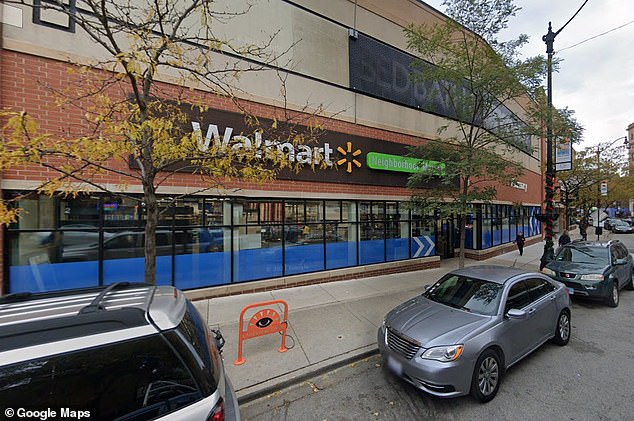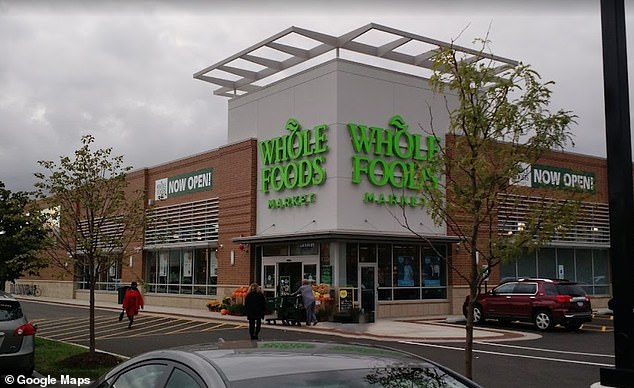Chicago’s Dem Mayor Brandon Johnson now wants to create city-run grocery stores to promote ‘equitable’ access to food after Walmart and Whole Foods close stores
Chicago’s Democratic mayor wants to create city-run grocery stores to promote “equitable” access to food after half of the city’s Walmart and Whole Foods stores closed.
Mayor Brandon Johnson announced a partnership with the Economic Security Project to open municipal grocery stores in Chicago in an effort to address many of the city’s so-called “food deserts.”
Johnson’s new steps will help “repair the damage of the past that has contributed to deliberate disinvestment and exclusion and the lack of access to food” in historically disadvantaged communities.
The liberal mayor said, “All Chicagoans deserve to live close to convenient, affordable and healthy groceries.
Mayor Brandon Johnson announced a partnership with the Economic Security Project to open municipal grocery stores in Chicago. According to U.S. Department of Agriculture estimates, 63.5 percent of West Englewood residents and 52 percent of East Garfield Park residents live more than a half-mile from the nearest grocery store.
“We know that access to grocery stores is already a challenge for many residents, especially on the south and west sides.
“My administration is committed to advancing innovative, whole-of-government approaches to addressing these inequities.
“I’m proud to be working with partners to take this step in visualizing what a municipal grocery store in Chicago could look like.”
The city has not provided a timeline for when the initiative would emerge — and the grant money that will help invest could come from state and federal tax dollars, and not just local taxes, CBS reports.
There was mixed reaction to the plan.
One person wrote on social media: “Let’s see… major, successful retailers and grocery store operators have pulled out of certain zip codes due to chronic crime, but the city of Chicago is going to install and manage taxpayer-subsidized stores. What could go wrong?’
Another added: ‘People need to learn not to steal and the supermarkets don’t need to close.’
And a third said: ‘Residents should respect community businesses if they want their services.
“The city, with a $538 million budget deficit, that only owns grocery stores in some neighborhoods with taxpayer dollars is unsustainable and downright preferential. Work to eliminate the causes of store departures.”
Others accused Johnson’s idea of being akin to communism.
Another critic said: ‘If you want shops to be located in places like this, perhaps you should crack down on crime, especially shoplifting.
“It’s difficult for businesses to stay open when your stock is walking out the door with shoplifters.”

In April of this year, Walmart announced it would close four major stores in Chicago because they simply weren’t profitable enough
And someone else on social media said, “I don’t believe the city of Chicago could run an ice cream stand in the summer, let alone a grocery store.”
In April of this year, Walmart announced it would close four major stores in Chicago because they simply weren’t profitable enough.
This amounted to half of all stores in the Chicago area.
“The simplest explanation is that our Chicago stores have collectively not been profitable since we opened the first one nearly seventeen years ago – these stores are losing tens of millions of dollars a year, and their annual losses have nearly doubled in the past five years,” Walmart said in a statement.
“The remaining four stores in Chicago are still experiencing the same business issues, but we believe this decision gives us the best opportunity to keep them open and serving the community.”
Last November, Whole Foods in Englewood closed, depriving the neighborhood of fresh food products and leaving the site vacant for nearly a year.
The closures were announced just days after newly elected liberal Chicago Mayor Brandon Johnson blamed the city’s poverty and crime on businesses that don’t pay taxes.
Although Walmart did not specify in their statement the exact causes for the continued losses over the years at its Chicago stores, some on social media immediately pointed to the area’s crime rate.
According to Chicago police, robberies are up 25 percent so far in 2023 and 2022, while robberies are up 11 percent.
In 2022, Walmart CEO Doug McMillon had warned that theft at stores across the country could impact stores and lead to additional closures.

Whole Foods closed in Englewood in November 2022, depriving the neighborhood of fresh food products and leaving the site vacant for nearly a year
Despite the earlier warnings, the company called the decision difficult.
‘The decision to close a store is never an easy one. The impact is greater than just closing a building. It affects people – people who work, shop and live in communities near our stores – and we never take that lightly,” Walmart said.
Walmart officials also cited “business issues” in their statement about the remaining four Chicago stores.
According to U.S. Department of Agriculture estimates, 63.5 percent of West Englewood residents and 52 percent of East Garfield Park residents live more than a half-mile from the nearest grocery store.
Ameya Pawar, senior advisor at the Economic Security Project, said, “The City of Chicago is rethinking the role government can play in our lives by exploring a public grocery option through a municipal supermarket and market.
“Not unlike the way a library or the postal service operates, a public option provides economic choice and power to communities.
“A supermarket on the south or west side of Chicago would be a viable way to restore access to healthy food in areas that have suffered from historic and systemic disinvestment.”
